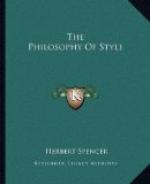53. Thus poetry, regarded as a vehicle of thought, is especially impressive partly because it obeys all the laws of effective speech, and partly because in so doing it imitates the natural utterances of excitement. While the matter embodied is idealized emotion, the vehicle is the idealized language of emotion. As the musical composer catches the cadences in which our feelings of joy and sympathy, grief and despair, vent themselves, and out of these germs evolves melodies suggesting higher phases of these feelings; I so, the poet develops from the typical expressions in which men utter passion and sentiment, those choice forms of verbal combination in which concentrated passion and sentiment may be fitly presented.
54. There is one peculiarity of poetry conducing much to its effect—the peculiarity which is indeed usually thought its characteristic one—still remaining to be considered: we mean its rhythmical structure. This, improbable though it seems, will be found to come under the same generalization with the others. Like each of them, it is an idealization of the natural language of strong emotion, which is known to be more or less metrical if the emotion be not too violent; and like each of them it is an economy of the reader’s or hearer’s attention. In the peculiar tone and manner we adopt in uttering versified language, may be discerned its relationship to the feelings; and the pleasure which its measured movement gives us, is ascribable to the comparative ease with which words metrically arranged can be recognized.
55. This last position will scarcely be at once admitted; but a little explanation will show its reasonableness. For if, as we have seen, there is an expenditure of mental energy in the mere act of listening to verbal articulations, or in that silent repetition of them which goes on in reading—if the perceptive faculties must be in active exercise to identify every syllable -then, any mode of so combining words as to present a regular recurrence of certain traits which the mind can anticipate, will diminish that strain upon the attention required by the total irregularity of prose. Just as the body, in receiving a series of varying concussions, must keep the muscles ready to meet the most violent of them, as not knowing when such may come; so, the mind in receiving unarranged articulations, must keep its perceptives active enough to recognize the least easily caught sounds. And as, if the concussions recur in a definite order, the body may husband its forces by adjusting the resistance needful for each concussion; so, if the syllables be rhythmically arranged, the mind may economize its energies by anticipating the attention required for each syllable.




